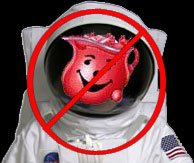
Ok, i've debated posting about this one for over a week now, but two recent media pieces steered me towards weighing in. However, rather than poorly restate what was so eloquently put out there by these two gentlemen, I simply provide their words to you.
First, Jon Stewart's skewering of the media and their coverage of the sad "NASA Astronaut Love Triangle" story (from which I took the title of this blog post as well)
Space Puns Might Astro-Not Be A Good Idea
Second, a great essay by Homer Hickam, which originally appeared in the LA Times.
Space cadets: What would make an astronaut crack?
Too many astronauts for too few slots part of problemBy HOMER HICKAM
As a former NASA astronaut training manager responsible for crew training for shuttle missions, I was not entirely surprised by the initial reports of the sad, bizarre case of Lisa Marie Nowak.
This isn't the first case of astronauts having difficulties in their personal lives. Usually, the straying astronaut simply resigns or retires, and everything is hushed up. But being charged with assault, attempted kidnapping and attempted murder is far greater than anything I ever observed or imagined could occur. Perhaps this tragedy will bring some of the agency's long-ignored problems into the open.
First is the tremendous and unnecessary pressures brought to bear on the members of NASA's cloistered astronaut office. This is the division at the Johnson Space Center in Houston where the astronauts work. It is the office that assigns each astronaut his or her job. Since most astronauts are waiting to be put on a mission, these jobs — such as working on the shuttle hydraulic system or sitting in on meetings about a new science payload — are important, but they're usually no more difficult than the ones accomplished routinely by other NASA engineers and scientists. The difference is the astronauts come under constant scrutiny by their management to determine who will fly and who will not. Some never get assigned to a space mission, yet they are called astronauts as long as they work for the National Aeronautics and Space Administration.
Nowak was hired as an astronaut in 1996. It was a decade before she flew into space. During that time, she was passed over again and again. Somewhere along the line during those disappointing years, I think she became brittle. She finally flew, landed and then was sent to the back of the astronaut line again. My guess is that her personal life started to become unglued from the accumulated strain, and she finally cracked.
But why did Nowak have to endure 10 years of scrutiny and constant competition with her fellow astronauts before she got to fly? The fact is, there are too many astronauts (more than 125) and not enough opportunities to fly. The NASA inspector general said the same thing in a 2003 report. Yet the astronaut office hired 11 more astronauts in 2004. Last year, the shuttle flew three times, carrying just seven astronauts per flight. Its replacement vehicle, which is under design now, will carry at most six astronauts.
Does it make sense to have this many overachievers all walking on eggs, vying for such a limited number of slots?
Only in a dysfunctional bureaucracy like NASA's astronaut office, which keeps hiring more astronauts than it needs.
As a training manager, I was aware that many astronauts felt as if they were powerless, stressed-out peons within their own organization. I observed their daily competition with one another to get a seat into space. In many cases, this trial by fire changed enthusiastic young astronauts into bureaucratic combatants with warped personalities and shaken confidence.
For a long time, I also have been aware of the corrosive resentment many NASA engineers and scientists feel toward the astronauts. The astronauts have a sense of entitlement, and what they want, they get, or so it seems. For instance, I was in a meeting once in which an astronaut who only had a few years of NASA experience constantly interrupted and belittled a 20-year space engineering veteran. That's the kind of thing that fuels discontent.
My suggestion to lessen the pressure on the astronauts and also to decrease the resentment others in the agency feel toward them is to reorganize their office, first by shrinking it. There are two types of astronauts — pilots and mission specialists. The latter are more or less like flight engineers who are generalists. They operate robotics, perform experiments and go on spacewalks. They make up the bulk of the astronaut corps, and we just don't need so many. They should be offered other jobs within the agency. There would remain just a small, core group confident that they will fly.
The remaining seats on shuttle flights should then be opened up to the top tier of space scientists and engineers in the country from outside NASA. Right now, the only Americans allowed to fly aboard our spacecraft are the employees of the astronaut office, who live in a closed community with little outside influence. That is just not right, nor is it healthy.
To bring in the best of the best from outside the agency to fly would not only result in better science and engineering, it would also inject a constant stream of fresh air into a program that, as the Nowak tragedy reveals, is very much in need of it.
Hickam is the author of "Rocket Boys/October Sky," and "The Keeper's Son," among others. This article originally appeared in the Los Angeles Times.




